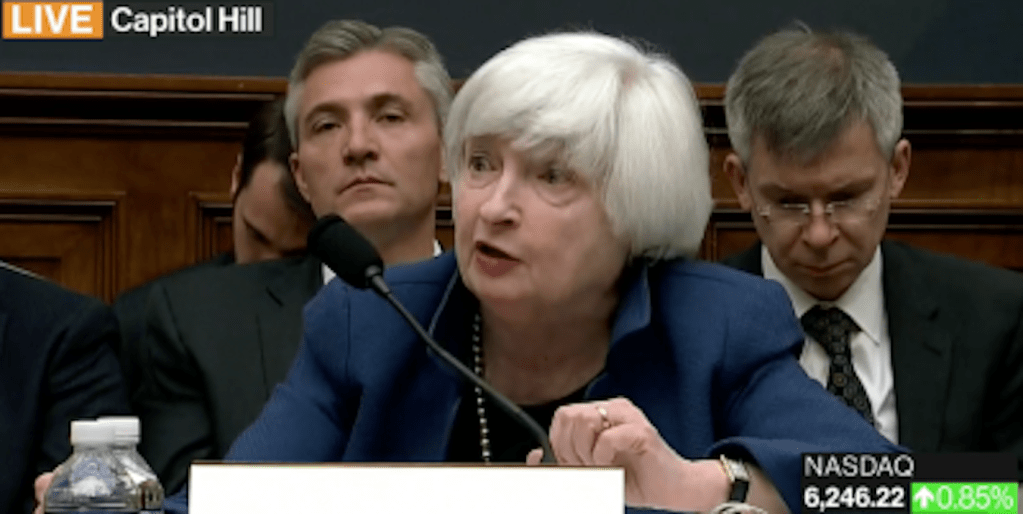When it comes to continuing suspensions of policies that roiled the mortgage market in 2021, the ball is now in the U.S. Treasury‘s court.
The Federal Housing Finance Agency and Treasury agreed in September 2021 to end limits imposed by the Trump administration on overall volume and the kind of mortgages lenders’ could sell to Fannie Mae and Freddie Mac. The limits, set in January 2021 by then-FHFA Director Mark Calabria and Treasury Director Steven Mnuchin, had infuriated the mortgage industry, and was one of the first items Sandra Thompson tackled after she became acting director of the agency.
But instead of wiping out those provisions for good, the FHFA and Treasury elected to hit pause. Whether that suspension will continue is something of a mystery for industry stakeholders.
Those suspensions are set to lapse Sept. 14 and six months from whenever the Treasury gives the FHFA notice, whichever is later. A Treasury spokesperson said both conditions have to be satisfied for the suspensions to lift.
A Treasury spokesperson said the Treasury would not need FHFA’s permission to give notice to terminate the suspensions. FHFA said it has not received notice from the Treasury.
A spokesperson for FHFA said that terminating the suspensions would be a “coordinated process,” and conversations about changes to the Preferred Stock Purchase Agreements (PSPAs) are regularly conducted at the “highest levels.”
Formal changes to the document that contains the provisions — the PSPAs — are haggled over by the Treasury and the FHFA.
Negotiating on behalf of the government sponsored enterprises, as their conservator, is FHFA Director Thompson. On the other side of the table is Treasury Sec. Janet Yellen, since her agency holds a majority stake in the GSEs. Both FHFA and Treasury declined to provide information about the specific staff responsible for the agreement which governs most of the mortgage market.
At the very least, statute requires Thompson and Yellen meet four times a year, in quarterly meetings of the Federal Housing Finance Oversight Board, on which Yellen serves and Thompson chairs.
The PSPAs have been formally amended just four times since 2008, the year the Treasury took control of warrants representing a 79.9% stake in each GSE. Those changes each centered around GSE finances. Notably, the 2019 amendment allowed Fannie Mae and Freddie Mac to maintain capital reserves of $25 billion and $20 billion, respectively.
But the 2021 amendments to the PSPA took a dramatic turn into policy territory. The agreement between Mnuchin and Calabria mandated that mortgage lenders selling to the GSEs could not exceed a volume cap of 7% of mortgages secured by investment properties. The agreement also limited the amount of unpaid principal balance mortgage lenders could sell to the GSEs for cash to $1.5 billion per calendar year.
The mortgage industry protested the changes, largely through major trade groups such as the Mortgage Bankers Association.
Now, for market participants, the thought that those suspensions may be lifted is troubling. Some mortgage finance lobbyists are also concerned that the Treasury could unilaterally terminate those suspensions.
In a letter to Thompson and Yellen sent last week, the Community Mortgage Lenders of America, which represents community banks, and the Community Home Lenders Association, which represents small and mid-sized mortgage lenders, asked the two agencies to continue the suspensions.
The volume and product limits, the letter stated, “then seemed akin to edicts literally handed down from on high, appearing as if from the clouds.”
After suspending the limits, the FHFA announced new upfront fees on high-balance and second home loans sold to the GSEs. The mortgage industry overall preferred the fees to the hard limits, but CHLA and CMLA argued in their letter that the fees were “excessive compared to their risk.”
“Therefore, we ask the Enterprises to reduce the LLPA fee hikes for low- and moderate-income borrowers and for lower-balance loans,” the letter reads.
And while the negotiations between FHFA and Treasury do not take place in a public forum, CHLA and CMLA said that after a face-to-face meeting with Thompson earlier this year, they had the impression she does not believe the PSPA is the correct forum for program and product changes. Whether Treasury shares that vision is not clear.
“We do understand that the current FHFA leadership has a different view of the scope of future
PSPA changes, and that FHFA is less inclined to use the PSPAs for sudden product and delivery policy changes,” the trade groups wrote.





